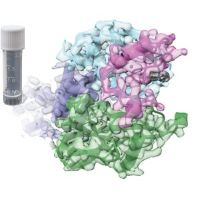Specification
| Description | Recombinant protein from the full-length sequence of Homo sapiens secretin (SCT) (NM_021920). |
| Organism | Homo sapiens (Human) |
| Expression Host | Human Cells |
| Tag Info | His or DYKDDDDK. Please contact us if you need further information or require specific designed tag. |
| Purity | Greater than 90% by SDS-PAGE gel |
| Uniprot ID | P09683 |
| Entry Name | SECR_HUMAN |
| Gene Names | SCT |
| Alternative Gene Names | |
| Alternative Protein Names | Secretin |
| Application | Antigens, Western, ELISA and other in vitro binding or in vivo functional assays, and protein-protein interaction studies; For research & development use only! |
| Buffer | Purified protein formulated in a sterile solution of PBS buffer, pH7.2, without any preservatives |
| Endotoxin | Endotoxin level is < 0.1 ng/µg of protein (<1EU /µg) |
| Length | 121 |
| Molecular Weight(Da) | 13016 |
| Protein Sequence | (The sequence of expressed protein may have some variation from the sequence shown below. Please contact us for the exact sequence.) MAPRPLLLLLLLLGGSAARPAPPRARRHSDGTFTSELSRLREGARLQRLLQGLVGKRSEQDAENSMAWTRLSAGLLCPSGSNMPILQAWMPLDGTWSPWLPPGPMVSEPAGAAAEGTLRPR |
Background
| Function | FUNCTION: Hormone involved in different processes, such as regulation of the pH of the duodenal content, food intake and water homeostasis (PubMed:25332973). Exerts its biological effects by binding to secretin receptor (SCTR), a G-protein coupled receptor expressed in the basolateral domain of several cells (PubMed:25332973). Acts as a key gastrointestinal hormone by regulating the pH of the duodenal content (By similarity). Secreted by S cells of the duodenum in the crypts of Lieberkuehn and regulates the pH of the duodenum by (1) inhibiting the secretion of gastric acid from the parietal cells of the stomach and (2) stimulating the production of bicarbonate (NaHCO(3)) from the ductal cells of the pancreas (By similarity). Production of bicarbonate is essential to neutralize the pH and ensure no damage is done to the small intestine by the gastric acid (By similarity). In addition to regulating the pH of the duodenal content, plays a central role in diet induced thermogenesis: acts as a non-sympathetic brown fat (BAT) activator mediating prandial thermogenesis, which consequentially induces satiation (Probable). Mechanistically, secretin released by the gut after a meal binds to secretin receptor (SCTR) in brown adipocytes, activating brown fat thermogenesis by stimulating lipolysis, which is sensed in the brain and promotes satiation (By similarity). Also able to stimulate lipolysis in white adipocytes (By similarity). Also plays an important role in cellular osmoregulation: released into the systemic circulation in response to hyperosmolality and acts at different levels in the hypothalamus, pituitary and kidney to regulate water homeostasis (By similarity). Also plays a role in the central nervous system, possibly by acting as a neuropeptide hormone: required for hippocampal synaptic function and neural progenitor cells maintenance (By similarity). {ECO:0000250|UniProtKB:P11384, ECO:0000250|UniProtKB:Q08535, ECO:0000303|PubMed:25332973, ECO:0000305|PubMed:30449620}. |
| Pathway | |
| Protein Families | Glucagon family |
| Tissue Specificity |
QC Data
| Note | Please contact us for QC Data |
| Product Image (Reference Only) |  |

